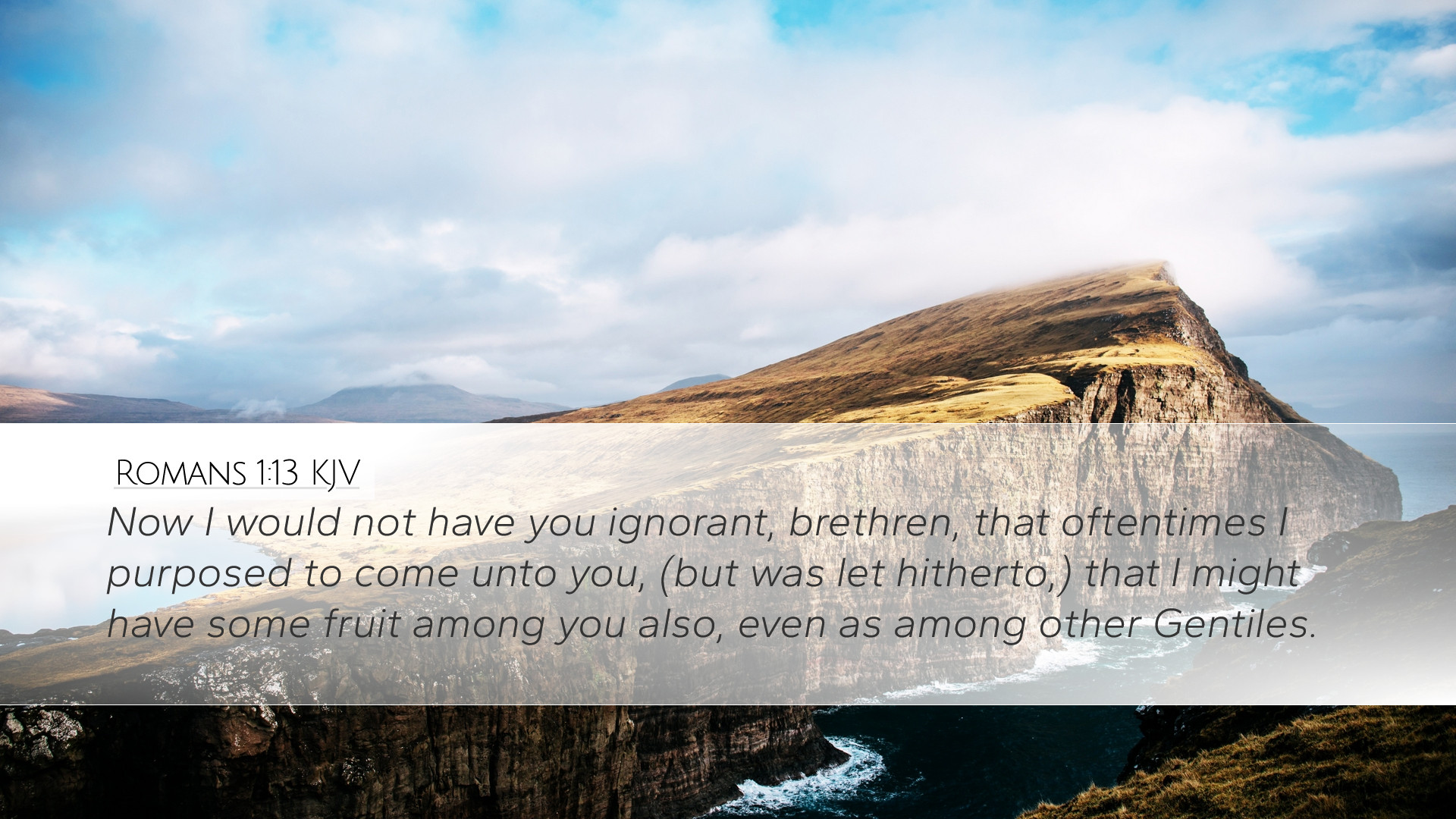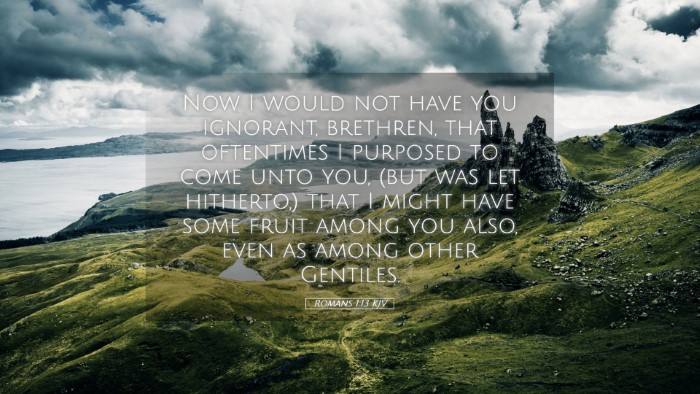Commentary on Romans 1:13
Romans 1:13 - "Now I would not have you ignorant, brethren, that oftentimes I purposed to come unto you, (but was let hitherto,) that I might have some fruit among you also, even as among other Gentiles."
Introduction
The Apostle Paul expresses a deep desire to visit the believers in Rome. This verse illustrates his pastoral heart and his commitment to the spread of the Gospel among both Jews and Gentiles. Here, we delve into various insights from prominent public domain commentaries, drawing from the teachings of Matthew Henry, Albert Barnes, and Adam Clarke to enrich our understanding of this passage.
1. Paul's Purpose and Desire
Paul begins this verse with an earnest acknowledgment of his intentions. The phrase "I would not have you ignorant" indicates a strong desire for transparency and connection with the Roman Christians. He wants them to understand the reasons for his delay in visiting them.
- Matthew Henry emphasizes the significance of Paul's intentions, highlighting that his plans were not contingent upon mere accident or failure but were rooted in divine providence. Paul’s desire was to reap spiritual fruit among them.
- Albert Barnes notes that this desire emphasizes Paul's pastoral role, capturing his longing to contribute to the spiritual growth of the Roman believers, akin to how other Gentile congregations had been enriched by his ministry.
- Adam Clarke elaborates on this notion by explaining that Paul experienced many obstacles to his plans, indicating the spiritual warfare and challenges faced by an apostle dedicated to the mission of God.
2. The Obstacles in Paul's Journey
Paul candidly states that he had been 'let hitherto,' suggesting that external factors had prevented his visit. The use of the word "let" signifies that these hindrances were more than mere logistical issues; they were part of a larger spiritual narrative.
- Matthew Henry remarks on God's sovereignty in the planning of our paths, suggesting that sometimes, even our desires might be thwarted for greater purposes, ultimately for the good of the church.
- Albert Barnes posits that these obstacles could be seen as part of God's providential ordering, preventing Paul from acting too hastily and ensuring that he would reach Rome at the appointed time in God’s divine plan.
- Adam Clarke highlights the notion that while Paul may have intended to visit sooner, the delays served to build anticipation within the community and strengthen the epistolary bond he would later establish through his letter to them.
3. The Spiritual Fruit Paul Aimed For
Paul’s ultimate goal in his visit was to have "some fruit among you also." This metaphor of 'fruit' signifies the spiritual results of his ministry, encompassing conversions, encouragement, and mutual growth in faith.
- Matthew Henry comments that spiritual fruit includes both the bringing of new believers into the fold and the edification of existing Christians. His expectation of 'fruit' indicates a reciprocal relationship of spiritual nourishment and accountability.
- Albert Barnes provides insights into the diverse forms of spiritual fruitage, noting that resilient faith, growth in holiness, and community-building are natural outcomes of apostolic ministry.
- Adam Clarke explains that Paul saw himself as a laborer in God’s vineyard, committed to the Great Commission, which emphasizes bearing fruit to the glory of God.
4. Broader Implications for Believers
This verse invites deeper reflection for all believers regarding their own missions and ministries. Paul’s longing serves as a model of pastoral care, love for the body of Christ, and the importance of maintaining fervent evangelism and discipleship efforts.
- Matthew Henry parallels Paul’s situation to modern Christians, urging them to be prepared for delays and challenges in their ministries, trusting God will fulfill His timing.
- Albert Barnes encourages believers to remain steadfast in their own callings, using their gifts to produce fruit for the Kingdom, even in times of waiting or obstacles.
- Adam Clarke emphasizes the importance of community and mutual encouragement, reminding us that the goal of ministry is not solitary achievement but collective growth in faith.
Conclusion
Romans 1:13 offers a profound look at the heart of the apostle Paul. His sincere desire to visit the Roman church encapsulates the essence of pastoral ministry and the challenges that often accompany it. By analyzing insights from Matthew Henry, Albert Barnes, and Adam Clarke, we gain a multifaceted understanding of this verse that transcends mere historical context, impacting our present-day Christian life and ministry. Paul’s dedication beckons all believers, especially pastors, students, and theologians, to embrace their calling with patience, purpose, and the expectation of spiritual fruit.


